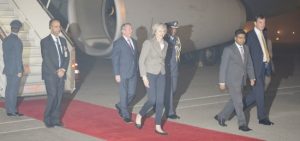 As British Prime Minister Theresa May began her three-day trip to India – the country May has described as UK’s “most important and closest friend” — armed with 40 delegates to pave the way for UK’s first post-Brexit trade deal, a tightened student visa regime that affects both students and workers is a critical stumbling block. But if the UK wants access to Indian markets, it needs to make itself more accessible to Indian nationals. Initial updates, however, indicate a non-compromising attitude, with reports surfacing of May rejecting calls to relax visa rules, at least for those pertaining to students.
As British Prime Minister Theresa May began her three-day trip to India – the country May has described as UK’s “most important and closest friend” — armed with 40 delegates to pave the way for UK’s first post-Brexit trade deal, a tightened student visa regime that affects both students and workers is a critical stumbling block. But if the UK wants access to Indian markets, it needs to make itself more accessible to Indian nationals. Initial updates, however, indicate a non-compromising attitude, with reports surfacing of May rejecting calls to relax visa rules, at least for those pertaining to students.
As the previous home secretary, May imposed stringent restrictions on student visas in a bid to dampen soaring migration figures. These included ending a Tier 1 post-study visa scheme that enabled foreign students at British universities to work in the country for two years after graduating. Other irritants include limiting time by which such students can switch courses, and the amount of time some can come to study for in the UK.
Such measures have affected the number of Indian students studying in the UK, which has halved from 40,000 to 20,000 in the last five years. UK immigration statistics show that the number of study visas issued to Indian nationals dropped from over 68,000 in June 2010 to 11,800 five years later.
While Indian students are facing a harsher visa policy, the number of Chinese students, who reportedly are wooed by comparatively more liberal UK visas that allow them to stay for longer durations, has increased from 55,000 to 90,000 in the same five-year period. To put things into perspective, overseas students contribute over $13 billion to the UK economy, and international students from non-EU countries generate 13% of universities’ revenues.
May, however, has stated that the UK already has “a good system” in place and that it wants to attract “the brightest and the best” from outside the EU while lowering migration numbers levels deemed acceptable. This does not bode well for prospective Indian nationals wanting to pursue further studies in the UK.
Already tight visa rules had also affected workers, such as chefs – from predominantly South Asian countries — at curry houses. New changes to its visa policy for non-EU nations announced just days before the start of May’s India visit will further constrain the mobility of India’s skilled white-collar workforce. Under the Tier 2 intra-company transfer category, used largely by Indian IT companies in Britain, applicants will be required to meet higher salary thresholds. New English language requirements when applying for settlement as a family member have also been put in place.
It is critical to note that India invests more in the UK that the rest of the EU combined. As per the UK Department of Trade, Indian firms were the third largest job creators in the UK in 2014-15.
Will Theresa May’s visit augur some relief for prospective students and workers in the UK? It is with great anticipation that both younger and older generations will be following May’s conversation with Modi in New Delhi on November 7.
Author Profile
- India Writes Network (www.indiawrites.org) is an emerging think tank and a media-publishing company focused on international affairs & the India Story. Centre for Global India Insights is the research arm of India Writes Network. To subscribe to India and the World, write to editor@indiawrites.org. A venture of TGII Media Private Limited, a leading media, publishing and consultancy company, IWN has carved a niche for balanced and exhaustive reporting and analysis of international affairs. Eminent personalities, politicians, diplomats, authors, strategy gurus and news-makers have contributed to India Writes Network, as also “India and the World,” a magazine focused on global affairs.
Latest entries
 DiplomacyJanuary 5, 2026India walks diplomatic tightrope over US operation in Venezuela
DiplomacyJanuary 5, 2026India walks diplomatic tightrope over US operation in Venezuela India and the WorldNovember 26, 2025G20@20: Africa’s Moment – The Once and Future World Order
India and the WorldNovember 26, 2025G20@20: Africa’s Moment – The Once and Future World Order DiplomacyOctober 4, 2025UNGA Resolution 2758 Must Not Be Distorted, One-China Principle Brooks No Challenge
DiplomacyOctober 4, 2025UNGA Resolution 2758 Must Not Be Distorted, One-China Principle Brooks No Challenge India and the WorldJuly 26, 2025MPs, diplomats laud Operation Sindoor, call for national unity to combat Pakistan-sponsored terror
India and the WorldJuly 26, 2025MPs, diplomats laud Operation Sindoor, call for national unity to combat Pakistan-sponsored terror







